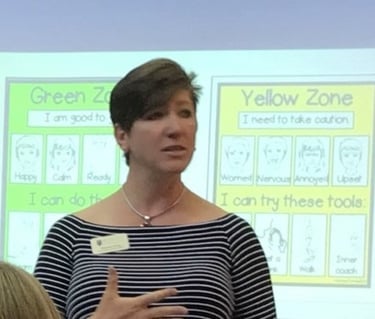The Ignorant Teacher
Teachers teach, and teachers learn, but we need more financial conversations to plan for retirement
RETIREMENT
7/24/20254 min read


Early in my career, I learned that I had some kind of a pension, but I didn’t really understand what that meant. I was ignorant. When I left my first teaching job and moved to Washington, I learned that I could withdraw my contribution from that pension but should leave it alone because my employer matched my earnings. I was still ignorant, but I chose to leave mine in that former state where it has been silently growing for 23 years. In that state, I can begin drawing that pension at age 60, full retirement age.
It was very late in my career when I started learning about the Washington State teachers’ Pension. I had never planned for retirement. I didn’t attend non-existent workshops at the district or state level. Who had time to learn that stuff? Retirement wasn’t even a blip on the radar because my head was fully engaged in the daily functions of children. So, imagine my surprise when I first started to open my ignorant eyes and ask questions about retirement. Where to look first? The internet, of course.
Within the Department of Retirement System (DRS) webpage teachers can find articles, webinars, and podcasts to help understand financial savings and retirement planning from the experts. The website is easy to use and categorized to help newly hired teachers as well as those in mid-career, early retirement, and full retirement. If you are a teacher, I recommend bookmarking this page and learning something from it periodically.
As I shifted from the ignorant teacher to the informed teacher, I learned that teachers have some unique resources. Using these resources gave me knowledge, ideas, and confidence to grow my savings and to retire early. For example, I learned that teachers on the Washington TERS plan 3 had two parts of a retirement savings plan.
A Pension: This is a retirement savings benefit offered by employers to their employees. Employers make regular contributions to a pool of money set aside at the state level to fund payments to eligible employees after they retire (a defined-benefit plan). A pension can pay out from the retirement date until death (or sometimes after death). In Washington, the full age of retirement is 65.
A Deferred Compensation Plan (DCP): This DCP (aka 457 plan) is a tax-advantaged retirement savings plan similar to a 401K plan, but with more benefits upon retirement. It is a “forced” investment vehicle to keep invested as long as you choose. From their website you can read more about your retirement group including:
Plans 1 and 2 members: Withdrawing your money means you are no longer a member of your retirement plan and, therefore, ineligible to receive a retirement benefit. There is no partial withdrawal option.
Plan 3 members: You can withdraw your investment contributions and investment earnings without affecting your pension income eligibility. If you meet the vesting requirements when you separate employment, you will still receive a monthly pension benefit when you are eligible to retire.
Taxes: If I withdraw my retirement or DCP funds, will they be taxed? Yes. Payments you receive are subject to income tax. Rollovers are not subject to income tax. To find out more about how taxes could affect you, contact a tax advisor.
For me, I had been silently adding to the DCP without even knowing it. My minimum contributions of 5% had been quietly growing in the background, but little did I know I could have been contributing 15% of my income and REALLY saving. Any financial advisor will tell you to contribute as much as you can afford to the long-term tax-advantaged plan. Since I separated from employment and the Washington State Retirement System, I am free to withdraw my DCP at any time and will be taxed accordingly when I withdraw. The retirement system will not consider me retired until I am at LEAST 55 years old. ***Side note: There are more benefits when you retire after age 55! Perhaps, I should have waited.
Whether you play on the DRS website or use your favorite Podcast app, another great resource to shift the ignorant teacher toward knowledge is Fund Your Future with DRS. This podcast was started in September 2022 to help beginner and experienced teachers understand the Department of Retirement System in the state of Washington. In less than 30-minutes per episode teachers can learn topics like, “Understand your Spending”, “Pros and Cons to Retiring at 55”, “How to Choose a Financial Advisor”, and “DCP Earnings and Annuities”.
There are a lot of really smart people in the world who will teach you some important lessons about money. I started listening to people like Dave Ramsey, Suze Orman, and The Money Guy Show just to start learning about terminology. If you don’t know the language, you can’t play the game of money. There are some great websites that can give you vocabulary lessons too including Investopedia, SmartAsset, and Nerdwallet. And finally, as my ignorance shifted, I listened to YouTube influencers like Joe Kuhn, Azul, Holy Schmidt, and EarlyRetireWonderlust who didn’t teach me as many financial skills, but gave me the courage and confidence to trust all the hard work I had invested in my future. It was time to turn the future into a present and gift myself retirement.
Every penny earned in your career will impact your life, now or later. To quote Benjamin Franklin, “The only thing that is more expensive than education is ignorance.” So, educate yourself with a little vocabulary and you will find many riches in your future.
Where did you learn about money? Did your parents give you an allowance? Did they help you open a bank account when you started babysitting? When did you learn the terms IRA, Pension, Contributions, Beneficiary? Did your husband or wife teach you about stocks, bonds, dividends, or annuities? We have to learn these things. I am not knowledgeable to give financial advice. In this article, I hope to share some of the vocabulary necessary to help you grow your own financial wealth toward retirement.
